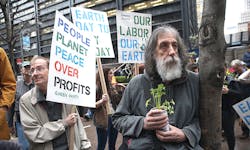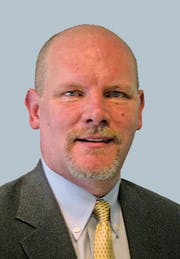In case you missed it, Earth Day was a few days ago. It’s a miserable day, celebrated by miserable people, seeking to force their misery and pessimism upon the world.
Misery? Pessimism? Earth Day has never been about hope and optimism. From day one through the present, the environmental movement is all about doom and gloom. Here are some examples from the very first Earth Day in 1970 …
... Paul Ehrlich, an American biologist and educator who is the Bing Professor of Population Studies in the department of Biological Sciences at Stanford University and president of Stanford's Center for Conservation Biology, said that air pollution would “take hundreds of thousands of lives in the next few years alone.”
Ehrlich, now 81 years-old, also said, “Population will inevitably and completely outstrip whatever small increases in food supplies we make. The death rate will increase until at least 100-200 million people per year will be starving to death during the next ten years.” He made many more dire predictions in his book, “The Population Bomb,” published in 1968. He also declared that by the middle of the 70s, “some experts feel that food shortages will have escalated the present level of world hunger and starvation into famines of unbelievable proportions. Other experts, more optimistic, think the ultimate food-population collision will not occur until the decade of the 1980s.”
Cheery guy, huh? Actually, compared to some of the other speakers, Ehrlich was a Pollyanna. Denis Hayes, who organized the very first Earth Day that occurred on April 22, 1970, said “It is already too late to avoid mass starvation.”
Harvard biologist George Wald predicted, “Civilization will end within 15 or 30 years unless immediate action is taken against problems facing mankind.”
It gets better (or worse). Ecologist Kenneth Watt declared, “The world has been chilling sharply for about twenty years. If present trends continue, the world will be about four degrees colder for the global mean temperature in 1990, but eleven degrees colder in the year 2000. This is about twice what it would take to put us into an ice age.”
Confused? It's Understandable.
In 1970, global cooling was the worry. Some of the same guys who fretting about the coming ice age now sweat global warming once it became popular. Why does anyone listen to them?
Watt, by the way, wasn’t worried about automotive pollution because he thought we would run out of oil. “By the year 2000,” he proclaimed, “if present trends continue, we will be using up crude oil at such a rate… that there won’t be any more crude oil. You’ll drive up to the pump and say,`Fill ‘er up, buddy,’ and he’ll say,`I am very sorry, there isn’t any.’”
These guys could make a mortuary cheerful. Fortunately, none of their predictions came to pass. Instead, things got better.
According to the EPA, from 1980 to 2008…
- Ambient carbon monoxide declined 79%. Emissions declined 58%.
- Ambient ground level ozone fell 25%. Emissions fell 49%
- Ambient levels of lead plunged 92%. Emissions plunged 96%.
- Ambient nitrogen dioxide dropped 46%. Emissions dropped 40%.
- Ambient sulfur dioxide is down 71%. Emissions are down 56%.
All of this happened against a backdrop of economic and population growth, making the reductions even more remarkable. By any and all measures, the air is getting cleaner every year. Water is cleaner. Endangered species are recovering. There are fewer toxic wastes. No one even talks about the ozone hole anymore. Global warming has halted and considering we just experienced the coldest winter in more than 100 years, may even be reversing.
Our scarce resources are less scarce too. According to the Energy Information Administration, proven oil reserves have increased 111% between 1980 and 2010. Natural gas reserves jumped 157% over the same time period. With new shale discoveries, both are even higher now.
You wouldn’t know anything about the improving environment or abundance of available energy if you talk with the environmentalists. They’re too busy screaming that the glass is about empty to notice that it’s gone from half full to three quarters full.
The environmental movement is about scarcity and doing without. Less is more, they say.
Less isn't more. It's less.
This is why Earth Day sucks. It promulgates a scarcity mentality.
In his landmark book, The 7 Habits of Highly Effective People, Stephen Covey contrasted an abundance mentality with a scarcity mentality. People with an abundance mentality believe there is plenty for everyone. They don’t worry when someone gets a bigger slice of the pie because they know the pie can grow. In business, they invest in their companies and people. They live in a world of hope, seeking and expecting prosperity.
People with a scarcity mentality live in a zero sum world. For every winner, there’s a loser. They live in fear of loss instead of anticipation of success. Things get worse for people with a scarcity mentality, never better.
Once, America was a possibility country, filled with people sharing an abundance mentality. We could do anything. We won two world wars and the cold war. We led the free world. Each generation enjoyed more prosperity than the one before it. We decided to put a man on the moon, and did. We decided to clean up our air and water, and did.
Today, it feels like the nation is in decline as we face scarcity and talk of sustainability. We’re in retreat. Leadership is considered “leading from behind,” whatever that means. Millennials can’t get jobs and don’t move out. The space shuttle’s shut down and we have to hitch rides in space from the Russians.
If the environmental movement deserves some credit for cleaner air and water (and it does), it also deserves a lot of blame for the national malaise affecting the country, starting with Earth Day. The environmental movement is packed with negative people serving up predictions of doom that never come true. No matter how many times they are proven wrong, no matter how many of their schemes fail, they’re never called to account for their track records of error. This is why Earth Day sucks.
Whatever the sentiment of the nation, you can create an abundance mentality within your company. Be good stewards of the world we live in, but reject the negativity and scarcity of the environmental movement. Instead of “sustainability,” seek sustainable profits, sustainable growth, and sustainable success. That’s a sustainability message we can all buy into.
Seek sustainable success with the Service Nation Alliance. Or, call 877.262.3341 and ask to speak to a Business Advisor. Limited, exclusive territories are still available.
Matt Michel is CEO of the Service Roundtable (ServiceRoundtable.com). The Service Roundtable is an organization founded to help contractors improve their sales, marketing, operations, and profitability. Call toll free: 877/262-3341 for more information about how to join.
About the Author
Matt Michel
Chief Executive Officer
Matt Michel was a co-founder and CEO of the Service Roundtable (ServiceRoundtable.com). The Service Roundtable is an organization founded to help contractors improve their sales, marketing, operations, and profitability. The Service Nation Alliance is a part of this overall organization. Matt was inducted into the Contracting Business HVAC Hall of Fame in 2015. He is now an author and rancher.

